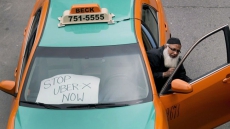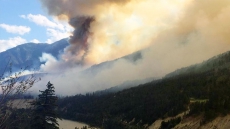VANCOUVER — A relentless heat wave and the soaring risk of more wildfires across British Columbia have forced the government to take extraordinary steps to impose a total ban on open burning, preserve water and suspend fishing in some areas.
But the measures were being tested within hours Friday as several small fires flared in a number of communities, including in a Kelowna neighbourhood.
The Regional District of Central Okanagan issued an evacuation order, which was quickly expanded, for a section of the Joe Rich area, where an aggressive grassfire was sparked late in the afternoon.
By the evening the order covered about 141 properties, while an evacuation alert covered another 158 properties.
Residents covered by the alert were asked to be prepared to leave on short notice.
A cause of that blaze was under investigation.
Earlier in the day, the Forests Ministry announced a Level 4 drought rating for southern Vancouver Island and the Gulf Islands, meaning water supplies are insufficient to meet the needs of communities and ecosystems.
The government also suspended all fishing in streams and rivers in that area because of low river levels and high water temperatures.
The ministry said it was watching 75 other key angling streams across B.C., and that the fishing ban could be extended if conditions warrant.

"It is important that we are able to react quickly to protect vulnerable fish stocks," Forests Minister Steve Thomson said in a news release.
Usually moist Haida Gwaii, as well as Metro Vancouver, the Sea to Sky and Sunshine Coast areas, the Fraser Valley and Fraser Canyon are all at a Level 3 drought rating, requiring residents to try and cut water use by another 20 per cent over regular reductions.
Metro Vancouver has responded to the record-breaking heat wave by moving the region to the second stage of its four-stage plan to handle water shortages.
Lawn sprinkling is now only permitted in the morning and should be restricted to once per week, while all commercial and public fountains and water features must be turned off. Only water parks with user-activated switches are allowed, while health and safety are the only permitted reasons for private or commercial washing of driveways, sidewalks and parkades.
The Forests Ministry also took the rare step of imposing a provincewide, immediate ban on all open burning.
Thomson said the ban will remain in effect until further notice and covers everything from campfires to fireworks, tiki torches and even exploding targets used for rifle practice.
"Given the hot and dry conditions in most of the province, we are implementing this provincewide campfire ban to help protect our communities," he said.
Only the area known as the fog zone, a narrow strip along the extreme west coast of Vancouver Island, is exempt.
Gas, propane or briquette cooking stoves, as well as CSA-approved portable campfire systems with flames of 15 centimetres or less are still allowed, but the province says that could change if dry conditions persist.

"We currently have 172 fires burning in the province," Thomson said. "The long-term strategic outlook projects we will have 250 to 300 new wildfires over the next 10 days, well above the normal average for the same period.
Penalties for violating the ban begin with a $345 ticket and could include an administrative penalty of $10,000 plus fines of up to $100,000 and a year in jail.



